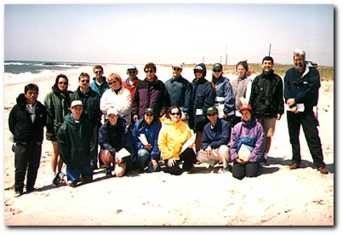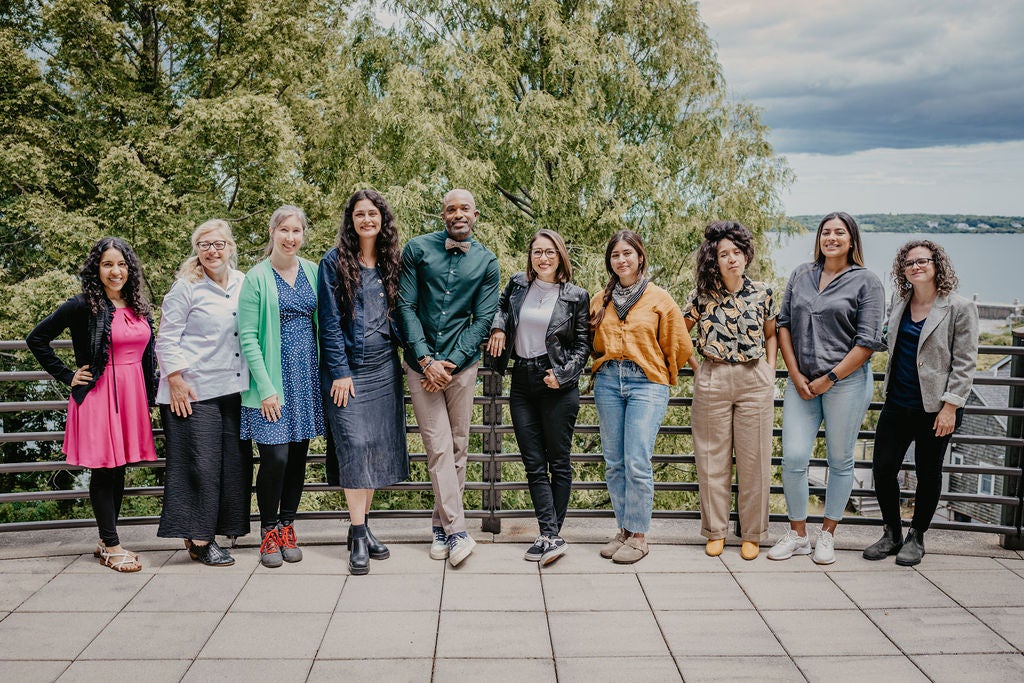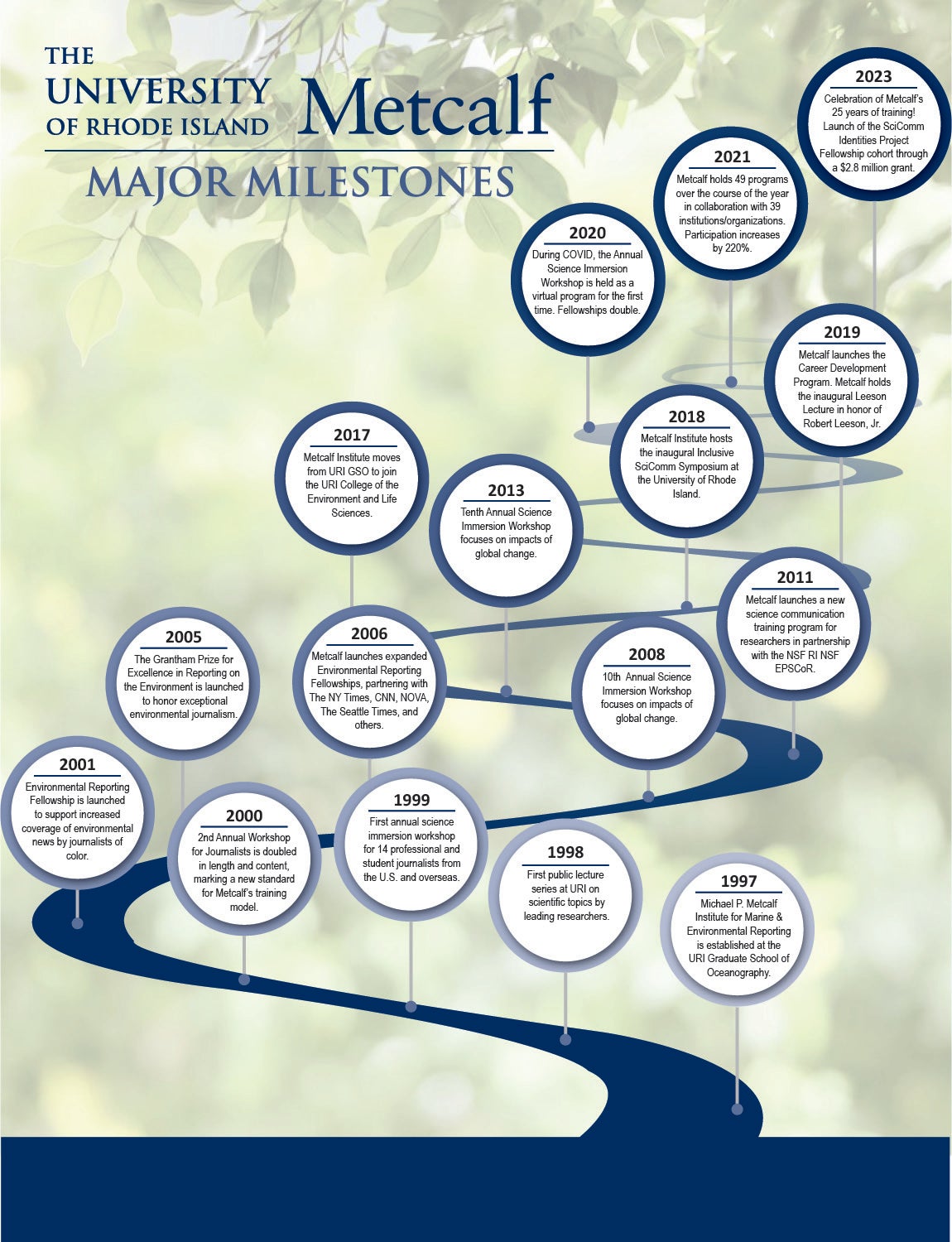“This workshop is nothing like I’ve ever experienced before. The chance to take a full week to learn and connect with journalists and members of the scientific community was invaluable, and something I will always treasure. ” -2023 Annual Workshop for Journalists Fellow
By Sarah Heavren
Over the past 25 years, Metcalf Institute has become a global leader in offering training for journalists and scientists in environmental reporting and inclusive science communication. With a small but highly dedicated team, Metcalf has trained more than 3,300 journalists, scientists, engineers, and other science communicators.
“Our alumni are professionals who are working all over the world to help diverse audiences understand environmental issues and to spark conversations about them. We’ve also supported the careers of early career journalists and researchers who have gone on to be really important voices in this work in their respective fields,” said former Metcalf Institute Executive Director Sunshine Menezes.
Originally called the Michael P. Metcalf Institute for Marine & Environmental Reporting, the Institute was launched to bring scientists and journalists together in off-deadline situations to help journalists improve coverage of environmental issues. Metcalf Institute’s story began in 1997, when Margaret Leinen, then-Dean of the URI Graduate School of Oceanography (GSO) and the College of the Environment and Life Sciences (CELS), along with Sara Hickox, then the Director of the GSO Office of Marine Programs, and Stephen Hamblett, then-publisher of The Providence Journal, developed a plan to bring scientists and journalists together. “Our namesake, the late Michael P. Metcalf, was a revered figure in journalism,” explained Menezes. Metcalf was a former publisher of The Providence Journal and was known for his high standards for journalism. Metcalf was supported by an endowment from the URI Foundation in 1997 and additional funding from the Telaka Foundation in 1998.
From the first public lecture series in 1998 and fellowship for journalists in 1999, through a novel environmental reporting fellowship for early-career journalists of color (2001-2009) and adding communication training for scientists and engineers to its portfolio starting in 2011, the Institute has had significant impacts in its first quarter century. “Metcalf has a number of things in common with other organizations, but our combination is what makes us unique,” explained Metcalf’s Program Director, Katharine McDuffie. “In addition to our training, we also offer a biennial symposium on inclusive science communication for a wide range of audiences; we provide public lectures and webinars of general interest on timely environmental topics; and we provide resources to trainees and the public.”

1998 Annual Workshop for Journalists 
2023 Annual Workshop Fellowship cohort
Metcalf has evolved alongside the changing tides of the journalism industry. In 2008, two years after Menezes first took over as Executive Director, newsrooms suffered major layoffs. Menezes said, “Newsrooms are really constrained in terms of their resources, which means that the Metcalf model of offering free training for journalists is more important than it ever has been. The ways the journalism industry has radically shifted have been a huge aspect of how we’ve had to adapt to thinking about what reporters and editors and newsrooms need, how we can provide it, and what is most effective,” Menezes said. The staff have been responsive to more than just shifts in the journalism industry. “Metcalf has been addressing social justice in our work since we started,” said McDuffie, “but like many organizations during the Black Lives Matter protests in 2020, we’ve worked to be more explicit about justice, equity, diversity, and inclusion in our mission, strategic goals and in our programming.” Always ready to adapt to the times, Metcalf continued to push through the turmoil of the pandemic. “We created programs addressing misinformation about science and learned how to work efficiently and effectively in virtual settings. Much of what we applied from that period of experimentation has made our training better,” said McDuffie.
One of Metcalf Institute’s most far-reaching innovations was the creation of the biennial Inclusive SciComm Symposium. Launched in 2018, the symposium aims to support a growing, international community of practice that is making inclusion, equity, and intersectionality central to science communication. “The fact that we have played a big role in supporting the growth of inclusive science communication through the Symposium and our related resources is something I’m personally deeply proud of,” said Menezes.
One of the Institute’s newest programs is the SciComm Identities Project (SCIP) and the SCIP Fellowship, which are designed to build science communication skills for faculty from diverse ethnic and racial backgrounds. The program is a collaboration among Metcalf, Michigan State University’s Knight Center for Environmental Journalism, and the URI Science and Story Lab. The five-year grant project is developing, testing and evaluating a new science communication training curriculum that embraces Fellows’ identities and experiences as central to their science communication practice.
While Metcalf Institute has had tremendous impacts on environmental reporting and science communication, it also has provided many opportunities for students to acquire vital science communication skills. Menezes, herself, is among a large number of URI students who have benefited from this practice. She first started working as a student employee while pursuing her doctorate in oceanography at URI’s Graduate School of Oceanography. “One of the best things Jackleen de la Harpe, Metcalf’s first Executive Director, did, out of a number of great things, was to involve graduate students in Metcalf training from the beginning,” Menezes said. The Institute has continued to support the growth of science communication skills in URI undergraduate and graduate students and postdoctoral scholars through the Career Development Program, a collection of 65 workshops on career and communication skills for young scientists and engineers.
As Metcalf enters its next phase, Menezes and McDuffie hope it will continue offering innovative and impactful programming to its core constituencies. With more programming comes a need to build out the team. “We have always had a lot more demand and a lot more ideas than we can achieve based on the person power we have,” Menezes reflected.
Metcalf Institute is growing, and it will begin a new era with a new Executive Director. Fara Warner is bringing over thirty years of experience in journalism, climate communication, and editorial leadership as the new Executive Director of Metcalf Institute. “I’m honored to be joining the Metcalf Institute and excited to continue and expand on the work that it has been doing for 25 years,” said Warner. “The foundation that has been built to train journalists in how science and scientists work and, in turn, supporting scientists to amplify their research to wider audiences is phenomenal, especially in the area of inclusive science communication,” Warner said. With a new Executive Director comes a new set of ideas.”I’d like to expand our work beyond individual journalists and focus on newsroom-wide efforts to better understand climate and environment science and in time bring Metcalf’s expertise to other disciplines as well,” said Warner.
With the momentum of trademark programs such as the Annual Science Immersion Workshop for Journalists and the innovation of programs like the SciComm Identities Project Fellowship, Metcalf has made an indelible mark in its goal of advancing informed, inclusive public conversations about science and the environment. Even after more than 25 years, Metcalf’s story is only beginning.
Sarah Heavren is a College of the Environment and Life Sciences Communications Fellow at the University of Rhode Island, and has worked with Metcalf Institute for the past two years.

